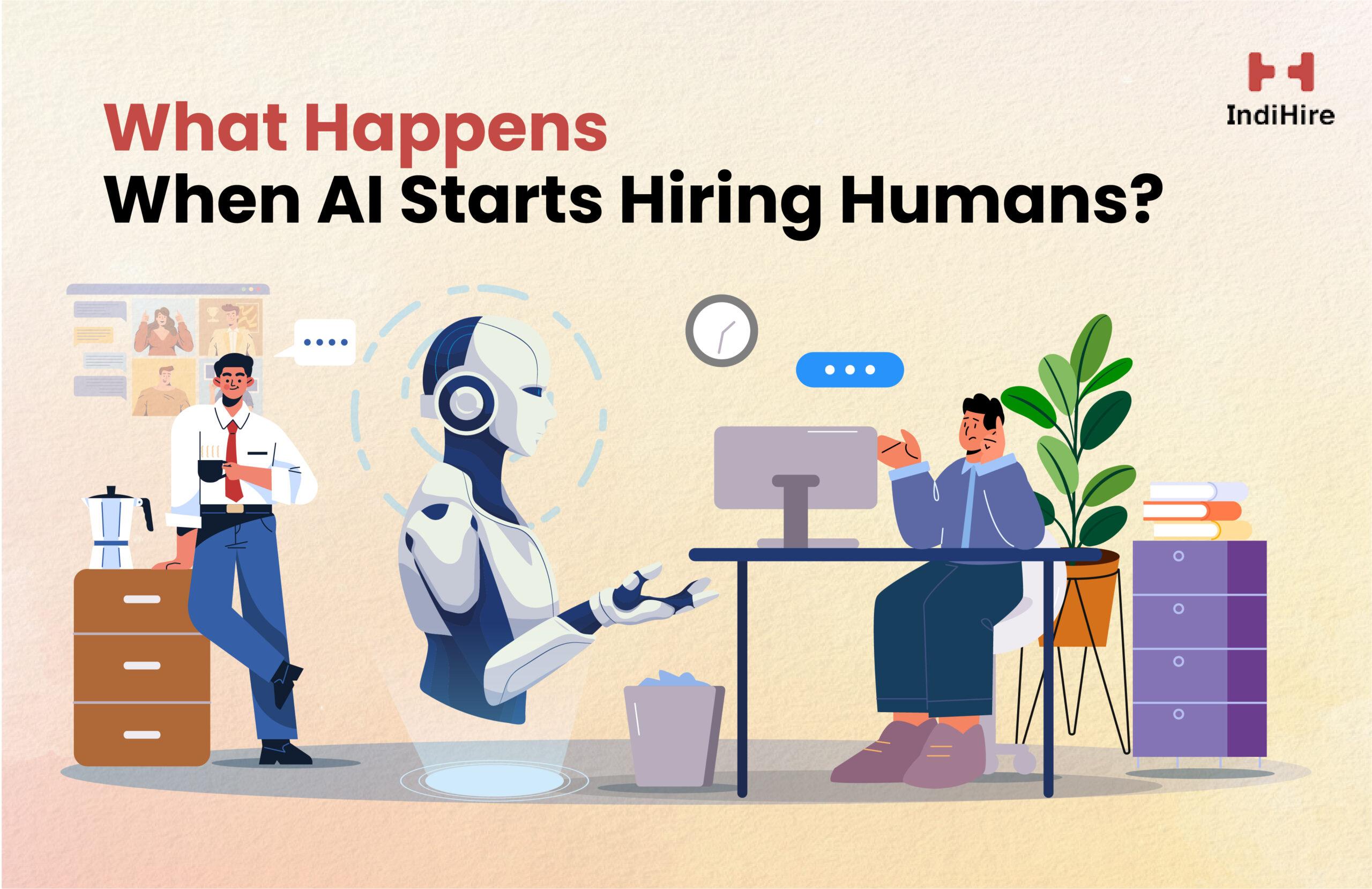What Happens When AI Starts Hiring Humans?

Reading Time: 5 min
You are scrolling through job listings on a rainy afternoon, coffee in hand, when suddenly your phone buzzes. Alex, a bot instead of a recruiter is informing you that you have been shortlisted for a role.
But the thing is, Alex is not just scheduling – it is deciding if you are the right fit.
Welcome to the future of hiring, where machines might soon be calling the shots. As TA professionals, we have all felt the change, but what happens when AI starts hiring us humans?
AI is already reshaping recruitment, but what does it mean for your daily grind?
The Rise of AI in the Hiring Game
Picture a busy office, resumes piling up like autumn leaves. Traditionally, you would have sifted through them, hunting for that perfect candidate. But now, AI is stepping in, and it is not just helping – it is transforming the whole process.
We are talking about tools that scan CVs faster than you can say “next”, predict who is likely to stick around, and even conduct initial chats.
Take applicant tracking systems (ATS), for instance. These are not new, but they are getting smarter.
But what if the AI rejects your own resume because it does not like your font choice? We have all been there with software – where a perfectly qualified candidate got lost because their keywords did not match.
And it is not stopping at screening. AI chatbots are interviewing candidates via video or text, analysing responses for everything from enthusiasm to cultural fit. But does this mean fewer coffee chats with potential hires? Probably, but it also frees you up for the human stuff that matters.
Yet, let’s be real – AI is not perfect.
It can inherit biases from its training data. If the system learns from a history of hiring mostly young, urban folks, it might overlook a gem from a rural background. That’s where we come in, ensuring these tools are fair and square.
When AI Becomes the Boss
What if AI starts hiring humans outright? We are not quite there, but trends point that way.
Imagine an algorithm as your hiring manager, crunching data on skills, experience, and even social media vibes to make offers. Sounds efficient but also a little creepy.
But AI will also help you reduce bias during the process. Let’s take an example. What if a recruiter rejected a stellar candidate just because they reminded her of an ex. AI would not care about that at all. But would you trust a machine to spot that spark of creativity in a candidate’s eyes?
Probably not yet. Current AI excels at patterns, not nuances. For instance, in creative fields, how does a bot evaluate a portfolio’s “Creative” factor? It is like asking a robot to judge a baking contest – it might count the chocolate chips but miss the love baked in.
On the flip side, AI could democratize hiring. No more favouritism or gut feelings gone wrong.
Still, ethical concerns are present. We have situations, like the one with Amazon’s AI tool that favoured male candidates. As recruitment professionals, we need to audit these systems regularly. Think of it as giving AI a performance review.
The Human Touch
So, AI is knocking on the door, but does that mean we are out of a job? Not at all. It is more of a partnership. You take on the role of a strategist, while AI does all the formalities. We can focus on building relationships, negotiating offers, and fostering company culture – stuff no algorithm can replicate.
Treat AI as a tool and not a replacement. You can integrate AI for initial screening, but always loop in humans for finals. Result? A significant drop in Hiring time, and improvements in employee satisfaction.
But if AI hires everyone, who programs the AI? Does it sound like the chicken-and-egg scenario? Yes, but with circuits.
On a serious note, we must improve & upskill. Learn to interpret AI insights, spot its blind spots, and even train it better.
Here are a few suggestions to make this balance work:
- Audit Regularly: Check AI outputs for bias.
- Hybrid Models: Use AI for volume tasks, humans for empathy-driven ones.
- Train Your Team: Workshops on AI literacy – because who wants to be the one left behind?
- Ethical Guidelines: Develop policies ensuring transparency. Tell candidates when AI is involved.
AI is like an autopilot. It gets you there efficiently, but you still need a pilot for turbulence.
Future-Proofing Your Role
AI might evolve to handle end-to-end hiring by 2030. But do not panic. Instead, adapt.
Ever thought about interviewing the AI before letting it interview others? Funny, but smart. Test its logic with mock scenarios. What if when AI starts hiring, you get a better work-life balance? Less admin means more time for strategic thinking or a long lunch break.
To stay ahead:
- Stay Informed: Follow trends via podcasts like “The Future of Work”.
- Network: Join forums for recruitment pros sharing AI war stories.
- Experiment: Pilot AI tools in low-stakes areas first.
- Advocate for Humans: Push for regulations ensuring AI augments, not replaces.
A Final Thought
We have journeyed through AI’s current tricks and its potential to hire us.
Key takeaway? AI is not here to steal your job – it is here to supercharge it, making hiring faster, fairer, and maybe even fun.
But what do you think? Will AI make us better recruiters, or are we in for some rude awakenings? Think about your experiences with AI so far. Let’s keep the human element alive in this AI adventure. After all, in the end, it is people like us who make the difference.


